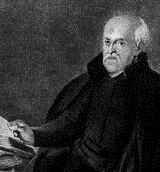| Profile | Major Works | Resources |
Juan de Mariana, 1536-1624.

16th C. Spanish Jesuit scholar from Toledo.
Although celebrated for his rather impressive history of Spain (1592), Juan de Mariana is perhaps far more famous for his controversial 1598 treatise on royal government (De rege et regis institutione). It is set out as a treatise on good government in the natural philosophy tradition. But in the course of treatise (Bk 1, C.6), Mariana came up with and defended the proposition that murdering a king is justified, if the king was a 'tyrant'.
But what is tyranny? Besides the usual definitions, Mariana extends the definition of "tyranny", which he takes a step further in his 1599 treatise on weights and measures and his 1609 essay on copper coinage. He posits a contractual theory of the king's source of power residing in the people, that their royal prerogative is not unlimited, and, most strenuously, that he is not the ultimate owner of all property, but rather that property is private, and belongs to the citizens, and that they have assigned him some property (e.g. taxes) by consent is not license to impose new taxes by royal prerogative. Interference by the sovereign in private economic matters without consent of the subjects constitutes a form of tyranny.
Oppressive taxation, of course, is an example of tyranny. But, Mariana notes in an addendum to De rege, and expanded upon in his 1609 De monetae essay on coinage, to include debasement of the currency as another form of it. An extreme metallist, Mariana considers it "unjust" for the tale value of a coin not to reflect its intrinsic metal content (allowance being made for modest seignorage to cover the expenses of coinage). So Mariana's initial objection is a moral objection. It is unjust, it steals from the subjects, it is nothing short of a heavy tax imposed without consent, and thus tyranny. He denies the right of kings to debase coinage. But he also posits a practical objection. In his 1609 essay, Mariana considers all the usual arguments in favor of debasement, and deploys his immense historical knowledge to judge whether those promised positive results have actually come to pass in episodes of Spanish history or the history of other nations. He notes that kings have debased really for only one reason: to wipe out their public debts. But he does so unjustly, he robs his people, and ultimately hurts the crown in the long run. All the other promised results don't usually materialize, debasement has always been followed by inflation, which disrupts commerce, raises the cost of living, encourages counterfeiters and is detrimental to the realm. So Mariana's opposition to debasement is twofold: it is unjust if undertaken without consent; and detrimental if undertaken with consent.
Juan de Mariana's contributions on money and economic role of the State were overshadowed by his reflections on tyrannicide. His De rege could not have been published at a less opportune moment. It was just around this time that the Jesuit Order, long resented and popularly suspected, was implicated in a few high-profile murder attempts, e.g. on the life of Henry IV of France in 1595 (by the young Jesuit friar Jean Chastel, which led to the brief expulsion of the Jesuits from France until 1603), on James I of England in 1605 (Gunpowder Plot) and on the prominent advocate Paolo Sarpi of Venice in 1606. In the hysterical pamphlets that circulated at the time, 'Jesuit' and 'regicide' were almost synonymous, and Mariana was accused of providing the philosophical defense and even encouraging such acts.
As a result, de Mariana's thesis became an instant success de scandale, and was given more alarmist airplay than it deserved. It was banned and publicly burned in several countries, notably France and, eventually, Spain. De Mariana's thesis was widely held up by political opponents of the Jesuits not as a personal philosophical exercise by a lonely scholar, but as a fundamental pillar of Jesuit theology, proof positive that the Jesuit Order was inherently regicidal and destabilizing. (In an ironic twist, when the Parlement of Paris, in the aftermath of the assassination of Henry IV in 1610, tried to ban de Mariana's work anew, they ran into the obstacle that by characterizing it as Jesuit theology, rather than political philosophy, it consequently became the prerogative of the University of Paris to decide whether or not to ban it, not the Parlement. And the Sorbonne hadn't recommended anything.)
Juan de Mariana was eventually imprisoned by Spanish authorities in 1610, where he remained until almost the end of his life. Surprisingly, it was not Mariana's defense of tyrannicide but rather his condemnation of debasement that got him charged with treason.
De Mariana's works were exploited anew in future anti-Jesuit waves, notably by Titus Oates in 1678 England and, more seriously, a century later, by the powerful Portuguese minister Marquis de Pombal, after an attempt on the life of King Joseph I of Portugal in 1758. Pombal's carefully-orchestrated propaganda campaign against 'Jesuit regicides' resurrected much material from de Mariana's thesis, and led to the expulsion of the Jesuits from Portugal, Naples, Spain and France in the 1760s and eventually the suppression of the Jesuit Order by the reluctant Pope in 1773.
|
Major Works of Juan de Mariana
|
|
Resources on Juan de Mariana
|
All rights reserved, Gonšalo L. Fonseca
